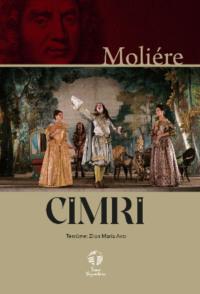 полная версия
полная версияThe Magnificent Lovers
Cli. Leave that to me. I understand court etiquette.
SCENE III. – ERIPHYLE, CLITIDASCli. (singing). La, la, la, la. (Affecting surprise on seeing Eriphyle.) Ah!
Eri. (to Clitidas, who affects to go away). Clitidas!
Cli. I did not see, you, Madam.
Eri. Come near. Where have you been?
Cli. With the princess your mother, who was just going towards the temple of Apollo, accompanied by a great many people.
Eri. Do you not think this one of the most charming places in the world?
Cli. Certainly. The two princes, your lovers, were there.
Eri. The river Peneus has here the most charming windings.
Cli. Very charming. Sostratus was there also.
Eri. How is it that he was not with us to-day?
Cli. He has something on his mind which prevents him from taking any pleasure in all those beautiful entertainments. He wanted to tell me something; but you have so expressly forbidden me to intercede for any one to you that I would not hear him, and I told him flatly that I had no leisure.
Eri. You were wrong to say such a thing to him, and you ought to have heard him.
Cli. I told him at first that I was not at leisure to hear him; but afterwards I listened to what he had to say.
Eri. You did well.
Cli. In fact, he is a man after my own heart; a man with all the manners and qualities I should like to see in all men. He never assumes boisterous manners and provoking tones of voice, but is prudent and careful in everything. He never speaks but to the point, is never hasty in his decisions, is never annoying by his exaggerations. However fine may be the verses our poets repeat to him, I have never heard him say, "This is more beautiful than anything that Homer ever wrote." In short, he is a man to my taste; and if I were a princess, I would not see him unhappy.
Eri. He is evidently a man of great merit; but what had he to say to you?
Cli. He asked me if you were very pleased with the royal entertainments that are offered to you. He spoke of your person with the greatest transports of delight, extolled you to the sky, and gave you all the praises that could be given to the most accomplished princess in the world, and with all this uttering many sighs which told me more than he thought. At last, by dint of questioning him in all kinds of ways, and pressing him to tell me the cause of his melancholy, which is noticed by everyone at court, he was forced to acknowledge that he is in love.
Eri. How, in love? What boldness is this? I will never see him again.
Cli. What are you offended at, Madam?
Eri. To be audacious enough to love me, and, moreover, to dare to say it!
Cli. It is not with you he is in love, Madam.
Eri. Not with me?
Cli. No; he has too much respect for you, and he is too wise to do such a thing.
Eri. With whom, then, Clitidas?
Cli. With one of your maids-of-honour, the young Arsinoë.
Eri. Is she so very beautiful that he can think none but her worthy of his love?
Cli. He loves her to distraction, and entreats you to honour his love with your protection.
Eri. Me!
Cli. No, no, Madam; I see that this offends you. Your anger forced me to make use of this subterfuge; and, to tell you the truth, it is you he loves to distraction.
Eri. You are an insolent knave to come thus to sound my feelings. Out of my sight this moment! Do you pretend to read people's thoughts and penetrate into the secrets of a princess's heart? Away with you; let me never see your face again… Clitidas!
Cli. Madam.
Eri. Come here. I forgive you this affair.
Cli. You are too kind, Madam.
Eri. But on condition – mind what I say – that you will never mention it to anybody, at the peril of your life.
Cli. Enough.
Eri. Then Sostratus told you that he loved me?
Cli. No, Madam; I must now tell you the whole truth. I got from him by surprise a secret he intended to conceal from all the world, and which he said he would wish to die with him. He was in despair when I wrenched it with subtlety from him; and, far from asking me to tell you of it, he entreated me with the most earnest prayers never to reveal anything to you; and I have committed a piece of treachery against him by telling you what I have said.
Eri. I am glad of it. It is by his respect only that he can please me; and if he were bold enough to tell me of his love, he would forfeit for ever both my presence and my esteem.
Cli. Do not fear, Madam …
Eri. Here he is. Remember, if you are wise, what I have forbidden you.
Cli. Certainly, Madam; I have no wish to be an indiscreet courtier.
SCENE IV. – ERIPHYLE, SOSTRATUSSos. I have an excuse, Madam, for daring to disturb your solitude. I have received from the princess your mother a mission which authorises the bold step I now take.
Eri. What mission is it, Sostratus?
Sos. To try, to learn from you, Madam, towards which of the two princes your heart inclines?
Eri. The princess my mother shows a judicious spirit in choosing you for such a message. This mission is very pleasant to you, no doubt, Sostratus, and you must have accepted it with great joy?
Sos. I have accepted it, Madam, because my duty obliges me to obey; and if the princess had kindly listened to my excuses, she would have appointed another for the task.
Eri. What reason could you have had, Sostratus, for refusing it?
Sos. The fear of not acquitting myself well.
Eri. Do you think that I have not enough esteem for you to open my heart to you, and say all you wish to know from me about the two princes?
Sos. As far as I am concerned, Madam, I have no desire to know anything; I only ask you what you think you can say in answer to the commands which bring me here.
Eri. Until now I have had no wish to explain myself, and the princess my mother has kindly allowed me to put off the choice which is to bind me. But I should be glad to show to everyone that I am willing to do something for your sake; and if you insist, I may give you this long expected verdict.
Sos. I will not importune you, Madam, and urge a princess who knows well what she has to do.
Eri. Yet it is what the princess my mother expects from you.
Sos. I told her that I was sure to acquit myself but badly of my message.
Eri. Well, tell me, Sostratus; you have far-seeing eyes, and I believe that there are few things that escape you. Have you not been able to discover what everybody is anxious to know? Have you no idea of the inclination of my heart? You see all the attentions that are bestowed on me, all the homage that is paid to me. Which of these two princes do you think I look upon with a most favourable eye?
Sos. The conjectures we make upon such matters generally arise from the greater or less interest we take.
Eri. Which would you prefer of the two, Sostratus? Tell me which one you would have me marry?
Sos. Ah! Madam! your inclination, not my wishes, must decide the matter.
Eri. But if I wished to consult you in this choice?
Sos. If you were to consult me, I should feel very much perplexed.
Eri. You could not tell me which of the two you think most worthy of preference?
Sos. If I were to be judge, I should find no one worthy of that honour. All the princes of the world would be too mean to aspire to you; the gods alone can pretend to you, and you would have from men but incense and sacrifice.
Eri. This is very kind, and I esteem you my friend. But I must have you tell me for which of the two you feel the greatest inclination, and which is the one you reckon your friend?
SCENE V. – ERIPHYLE, SOSTRATUS, CHORŒBUSCho. Madam, the princess is coming to fetch you to go to the wood of Diana.
Sos. (aside). Alas! how seasonably you came in.
SCENE VI. – ARISTIONE, ERIPHYLE, IPHICRATES, TIMOCLES, SOSTRATUS, ANAXARCHUS, CLITIDASAri. You are asked for, my daughter, and there are some who are much pained by your absence.
Eri. I should think, Madam, that they only asked after me out of compliment, and that no one is as pained as you say.
Ari. There are so many entertainments made for your sake that all our time is taken up, and we have not a moment to lose if we wish to see them all. Let us enter the wood at once, and see what awaits us there. This is the most beautiful place in the world. Let us take our seats quickly.
THIRD INTERLUDEThe stage represents a forest where the Princess has been invited to go. A Nymph does the honours, singing; and to amuse the Princess, a small musical comedy is played, the subject of which is as follows: – A shepherd complains to two other shepherds, his friends, of the coldness of her whom he loves; the two friends comfort him; at that moment the beloved shepherdess appears, and all three retire to observe her. After a plaintive love-song, she reclines on the turf, and gives way to sweet slumber. The lover makes his two friends approach to contemplate the beauty of his shepherdess, and invokes everything to contribute to her rest. The shepherdess, on waking up, sees her swain at her feet, complains of his persecution; but taking his constancy into consideration, she grants him his wish, and consents to be loved by him, in the presence of his two friends. The Satyrs arrive, upbraid her with her change, and, distressed by the disgrace into which they have fallen, look for comfort in wine.
Climene, PhilintePhilinteThere was a time I pleased you well,Content I lived, and loved the spell;I had not changed for god or throneThe sway o'er you I held alone.ClimeneSo, when by gentle passion swayed,You held me dear above all maid,The regal crown I would have spurnedIf for me still your heart had burned.PhilinteAnother's faith hath cured the woundI nursed for you within my breast.ClimeneAnother's love for me hath foundRevenge I sought, and kindly rest.PhilinteChloris the fair true passion sways, For me she pours her soul in sighs,And I would gladly close my days If so should bid her beauteous eyes.ClimeneMyrtil, of youthful hearts the flower, He loves me true e'en more than light;And I, to prove love's mighty power, Content, would pass to endless night.PhilinteBut if our passion's gentle ray A lingering spark would kindle anew,And from my heart expel to-day Chloris the fair, thy love to sue?ClimeneThough Myrtil loves me true, Though constant e'er to sigh,Still, I confess, with you I'd gladly live and die.Both (together)'Midst love then more than ever let us fleetThe lingering hours, and own a bond so sweet.Ballet, Divertissement, etcACT III
ARISTIONE, IPHICRATES, TIMOCLES, ERIPHYLE, ANAXARCHUS, SOSTRATUS, CLITIDASAri. We must always repeat the same words. We have always to exclaim: This is admirable! Wonderful! It is beyond all that has ever been seen.
Tim. You bestow too much praise on these trifles, Madam.
Ari. Such trifles may agreeably engage the thoughts of the most serious people. Indeed, my daughter, you have cause to be thankful to these princes, and you can never repay all the trouble they take for you.
Eri. I am deeply grateful for it, Madam.
Ari. And yet you make them languish a long time for what they expect from you. I have promised not to constrain you; but their love claims from you a declaration that you should not put off any longer the reward of their attentions. I had asked Sostratus to sound your heart, but I do not know if he has begun to acquit himself of his commission.
Eri. Yes, Madam, he has. But it seems to me that I cannot put off too long the decision which is asked of me, and that I could not give it without incurring some blame. I feel equally thankful for the love, attentions, and homage of these two princes, and I think it a great injustice to show myself ungrateful either to the one or to the other by the refusal I must make of one in preference to his rival.
Iph. We should call this, Madam, a very pretty way of refusing us both.
Ari. This scruple, daughter, should not stop you; and those two princes have both long since agreed to submit to the preference you show.
Eri. Our inclinations easily deceive us, Madam, and disinterested hearts are more able to make a right choice.
Ari. You know that I have engaged my word to give no opinion upon this matter, and you cannot make a bad choice when you have to choose between these two princes.
Eri. In order not to do violence either to your promise or to my scruples, Madam, pray agree to what I shall propose.
Ari. And what is that, my daughter?
Eri. I should like Sostratus to decide for me. You chose him to try to discover the secret of my heart; suffer me to choose him to end the perplexity I am in.
Ari. I have such a high regard for Sostratus that, whether you mean to employ him to explain your feelings or to leave him entirely to decide for you, I consent heartily to this proposition.
Iph. Which means, Madam, that we must pay our court to Sostratus.
Sos. No, my Lord, you will have no court to pay to me; and with all the respect due to the princesses, I refuse the glory to which they would raise me.
Ari. How is that, Sostratus?
Sos. I have reasons, Madam, which do not allow me to accept the honour you would do me.
Iph. Are you afraid, Sostratus, of making yourself an enemy?
Sos. I should have but little fear for the enemies I might make in obeying the will of my sovereigns.
Tim. Why, then, do you refuse to accept the power which is entrusted to you, and to acquire to yourself the friendship of a prince who would owe all his happiness to you?
Sos. Because it is not in my power to grant to that prince what he would wish from me.
Iph. What reason can you have?
Sos. Why should you so insist upon this? Perhaps I may have, my Lord, some secret interest opposed to the pretensions of your love. Perhaps I may have a friend who burns with a respectful flame for the divine charms with which you are in love. Perhaps that friend makes me the daily confidant of his sufferings, that he complains to me of the rigour of his fate, and is looking upon the marriage of the princess as the dreadful sentence which is to send him to his grave. Supposing it were so, my Lord, would it be right that he should receive his death-wound from my hands?
Iph. You seem to me, Sostratus, very likely to be that friend whose interests you have so much at heart.
Sos. I beg of you, my Lord, not to render me odious tote persons who hear you. I know what I am, and unfortunate people like me are not ignorant of the limits which fortune assigned to their desires.
Ari. Let us drop this subject; we will find means for overcoming my daughter's irresolution.
Ana. Are there better means of arriving at a conclusion that would satisfy everybody than to consult the light which heaven can give us on that marriage? I have already begun, as I told you, to cast the mysterious figures which our art teaches us; and I hope soon to be able to show you what the future has in reserve regarding this longed for union. After that, who can still hesitate? Will not the glory or the prosperity which will be promised to one or the other be choice sufficient to decide it, and can he who is rejected be offended when heaven itself decides who is to be preferred?
Iph. For my part, I submit to it altogether, and I declare that this way seems the most reasonable.
Tim. I am entirely of the same opinion, and whatever heaven may decide, I yield to it without reluctance.
Eri. But, my Lord Anaxarchus, do you really read so clearly destiny that you can never be deceived? And pray, who will give us security for this prosperity, this glory which you say heaven promises us?
Ari. My daughter, you have a little incredulity which never leaves you.
Ana. The proofs, Madam, which everybody has seen, of the infallibility of my predictions are sufficient security for the promises I make. But, in short, when I have shown you what heaven has in reserve for you, you may act as you please, and choose one or the other destiny.
Eri. Heaven, you say, Anaxarchus, will show me the good or bad destiny that is in reserve for me?
Ana. Yes, Madam; the felicity with which you will be blessed if you marry the one, and the misery that will accompany you if you marry the other.
Eri. But since it is impossible for me to marry them both at once, it seems that we find written in the heavens not only what is to happen, but also what is not to happen.
Cli. (aside). Here is a puzzler for our astrologer!
Ana. I should have to give you, Madam, a long dissertation on the principles of astrology to make you understand this.
Cli. Well answered. I have no harm, Madam, to say of astrology; astrology is a fine thing. My Lord Anaxarchus is a great man.
Iph. The truth of astrology is an incontestable fact, and no one can dispute the certainty of its predictions.
Cli. Certainly not.
Tim. I am incredulous enough in many things, but as regards astrology, there is nothing more sure or constant than the certainty of the horoscopes it draws.
Cli. The things are as clear as daylight.
Iph. A hundred accidents happen every day which convince the greatest unbelievers.
Cli. Quite true.
Tim. Who could contradict the many famous incidents which are related to us in books?
Cli. Only people devoid of common sense can do so; how can anything in print be doubted?
Ari. Sostratus has not said a word yet. What is your opinion about it?
Sos. Madam, all minds are not gifted with the necessary qualities which the delicacy of those fine sciences called abstruse require. There are some so material that they cannot conceive what others understand most easily. There is nothing more agreeable, Madam, than all the great promises of these sublime sciences. To transform everything into gold; to cause people to live for ever; to cure with words; to make ourselves loved by whomsoever we please; to know all the secrets of futurity; to bring down from heaven, according to one's will, on metals, impressions of happiness; to command demons, to raise invisible armies and invulnerable soldiers – all this is delightful, no doubt; and there are people who experience no difficulty whatever in believing all this to be possible; it is the easiest thing for them to conceive. But for me, I acknowledge that my coarse, gross mind can hardly understand and refuses to believe it; that, in fact, it thinks it all too good ever to be true. All those beautiful arguments of sympathy, magnetic power, and occult virtue, are so subtle and delicate that they escape my material understanding; and, without speaking of anything else, it has never been in my power to conceive how there is to be found in the heavens even the smallest particulars of the fortune of the least of men. What relation, what connection, what reciprocity, can there be between us and globes so immeasurably distant from our earth? And how, besides, can this sublime science have come to man? What god revealed it? or what experience can have been formed from the observation of that immense number of stars which have never as yet been seen twice in the same order?
Ana. It would not be hard to make you conceive it.
Sos. You would be more clever than all the others.
Cli. (to Sostratus). He will deliver you a long discussion about all this whenever you please.
Iph. If you do not understand such things, you can at least believe what is seen every day.
Sos. As my understanding is so gross that I never could understand anything, my eyes also are unfortunate enough never to have witnessed anything relating to it.
Iph. For my part, I have seen things altogether convincing.
Tim. So have I.
Sos. Since you have seen, you do well to believe; and your eyes must be differently made from mine.
Iph. But, in short, the princess believes in astrology; and I think we may well, after her example, believe in it also. Would you say that Madam has not intelligence and sense, Sostratus?
Sos. My Lord, your question is rather unfair. The mind of the princess is no rule for mine, and her understanding may raise her to light, which I, in my meaner sense, cannot reach.
Ari. No, Sostratus; I shall say nothing to you about many things to which I give no more credence than you do; but as for astrology, I have been told and been shown things so positive that I cannot doubt them.
Sos. Madam, I have nothing to answer to that.
Ari. We will say no more about this; leave us a moment. We will, my daughter and myself, go towards that fine grotto where I have promised to go. Ha! something gallant at every step.
FOURTH INTERLUDEThe stage represents a grotto, where the Princesses go to take a walk. As they enter it, eight statues, each bearing two torches, come down from their recesses, and execute a varied dance of different figures and several fine attitudes in which they place themselves at intervals.
BalletACT IV
SCENE I. – ARISTIONE, ERIPHYLEAri. Nothing can be more gallant or better contrived. My daughter, I wished to come alone here with you, so that we may have a little quiet talk together; and I hope that you will in nothing hide the truth from me. Have you in your heart no secret inclination which you are unwilling to reveal to me?
Eri. I, Madam?
Ari. Speak openly, daughter; what I have done for you well deserves that you should be frank and open with me. To make you the sole object of all my thoughts, to prefer you above all things, to shut my ears, in the position I am in, to all the propositions that a hundred princesses might decently listen to in my place – all that ought to tell you that I am a kind mother, and that I am not likely to receive with severity the confidences your heart may have to make.
Eri. If I had so badly followed your example as to have allowed an inclination I had reason to conceal to enter my soul, I should have power enough over myself to impose silence on such a love, and to do nothing unworthy of your name.
Ari. No, no, daughter; I had rather you laid bare your feelings to me. I have not limited your choice to the two princes; you may extend it to whomsoever you please; merit stands so high in my estimation that I think it equal to any rank; and if you tell me frankly how things are, you will see me subscribe without repugnance to the choice you have made.
Eri. You are so kind and indulgent towards me that I can never be thankful enough for it; but I will not put your kindness to the test on such a subject, and all I ask of you is to allow me not to hurry a marriage about which I am not decided as yet.
Ari. Till now I have left everything to your decision; and the impatience of the princes your lovers… But what means this noise? Ah! daughter, what spectacle is this? Some deity descends; it is the goddess Venus who seems about to speak to us.
SCENE II. – VENUS (in the air, accompanied by four CUPIDS), ARISTIONE, ERIPHYLEVen. (to Aristione). Princess, in you shines a glorious example, which the immortals mean to recompense; and that you may have a son-in-law both great and happy, they will guide you in the choice you should make. They announce by my voice the great and glorious fame which will come to your house by this choice. Therefore, put an end to your perplexities, and give your daughter to him who shall save your life.
SCENE III. – ARISTIONE, ERIPHYLEAri. Daughter, the gods have imposed silence on all our arguments. After this, all we have to do is to wait for what they wish to give us; and we have distinctly heard what their will is. Let us go to the nearest temple to assure them of our obedience, and to render thanks to them for their goodness.
SCENE IV. – ANAXARCHUS, CLEONCle. The princess is going away; do you not want to speak to her?
Ana. No; let us wait until her daughter has left her. I am afraid of her; she will never suffer herself to be led like her mother. In short, my son, as we have just been able to judge through this opening, our stratagem has succeeded. Our Venus has done wonders, and the admirable engineer, who has contrived this piece of machinery, has so well disposed everything, so cunningly cut the floor of his grotto, so well hid his wires and springs, so well adjusted his lights, and dressed his personages, that but few people could have escaped being deceived; and as the Princess Aristione is extremely superstitious, there is no, doubt that she fully believes in this piece of deception. I have been a long time preparing this machine, my son, and now I have almost reached the goal of my ambition.









